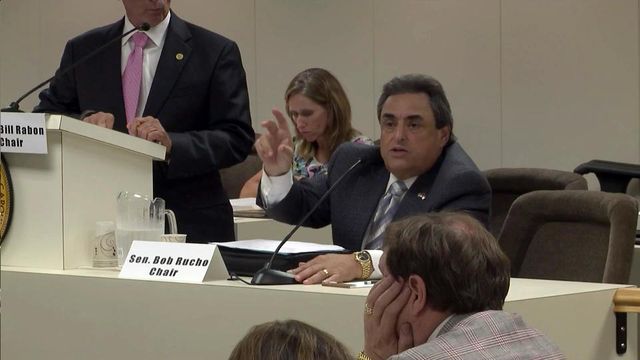Senate eases local sales tax restrictions
Senate leaders Monday rolled out a new version of a bill restricting how counties can use local sales taxes. The new version also includes a provision to legalize crowd-funding for businesses in N.C.
Posted — UpdatedThe new version of House Bill 1224 would still cap local sales taxes at 2.5 percent, but it deletes a proposal to force counties to choose between funding education or transit through additional taxes.
Most counties would have as much or more flexibility to raise sales taxes with voter approval under the new version as they do under current law.
It would allow counties to raise local sales taxes up to 0.25 percent for "general purposes," rather than solely for education or transportation.
"There were counties that said they would like the possibility to do libraries, to do sewer," explained Sen. Bob Rucho, R-Mecklenburg.
However, larger counties would have less ability to raise funds.
Wake County currently has a tax rate of 2 percent. Under current law, the county can ask voters for both a 0.25 percent increase for education and a 0.5 percent increase for transit. If voters were to approve both, the county's tax rate would be 2.75 percent.
Under the new proposal, the county could ask only for a total 0.5 percent increase, although county commissioners could decide to split the revenue between schools and transit.
Mecklenburg County voters are scheduled to vote in November on a 0.25 percent increase to improve teacher pay. If House Bill 1224 becomes law, the county, which already has a tax rate of 2.5 percent, would be forced to scrap that additional increase because it would exceed the new cap.
Sen. Majority Leader Harry Brown said the bill was prompted by "concerns about the rate that property taxes were being increased" in some counties.
"We felt like the sales tax was a fairer source – revenue source – than the property tax," Brown, R-Onslow, told the Senate Finance Committee.
Sponsor Sen. Rick Gunn, R-Alamance, said the changes in the new version were prompted by "dialogue with stakeholders, among ourselves, some of the county governmental entities."
"This gives options for counties to decide what’s important," added Gunn.
Sen. Josh Stein, D-Wake, argued that it gives Wake and Mecklenburg counties fewer options, not more.
"Please don’t represent this as being helpful to Wake County in any way, shape or form," Stein said.
Advocates for county and city advocates echoed Stein's concern.
Johanna Reese, government relations director for the North Carolina Association of County Commissioners, thanked Senate leaders for removing the "either/or" sales tax funding restriction but said the cap is still a concern for her group.
Erin Wynia, legislative and regulatory issues manager for the North Carolina League of Municipalities, urged lawmakers again to study the proposal over the interim.
"We don’t believe this bill goes far enough in giving local communities the flexibility to decide what’s best for them," Wynia said.
The new version of the bill also includes the crowd-funding provision that passed the House last year. It would allow North Carolina companies to solicit up to $1 million a year in small investments – up to $2,000 – from state residents.
Gunn said it would be "an appropriate tool" for the state to use to encourage start-ups, tech firms and entrepreneurs.
"As we continue to look at job creating legislation," Gunn said, "we really do have a serious capital issue out there. This crowd-funding bill certainly will help these small companies find a source of capital."
Senate Finance Committee Chairman Bill Rabon, R-Brunswick, said the committee will vote to approve the bill Tuesday or Wednesday.
Related Topics
• Credits
Copyright 2024 by Capitol Broadcasting Company. All rights reserved. This material may not be published, broadcast, rewritten or redistributed.





